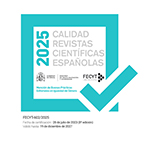Disinformation and Artificial Intelligence: the Case of Online Journalism in China
Resumen
pero creada y distribuida con una intención maliciosa. A pesar de sus posibles efectos negativos, la IA está transformando el panorama mediático junto con otras tecnologías. Este artículo explora la relación entre la IA y la desinformación en el contexto del periodismo en línea chino. La ciberesfera china se puede explicar a través de definiciones opuestas. Por ejemplo, China es un país donde los medios de comunicación masiva, especialmente los medios de noticias, están bajo vigilancia del gobierno y donde no hay medios polarizados, a diferencia de las democracias occidentales. Después de realizar una revisión sistemática de la literatura sobre la relación entre la IA, el periodismo y la desinformación en China, se detectaron vacíos en la literatura que incluyen las iniciativas autorreguladas realizadas por la IA dentro de los medios de comunicación, el impacto de la IA en el periodismo especializado, la evaluación de textos producidos por la IA, y los efectos de las campañas y productos de cámara de eco entre la población china
Descargas
Descarga artículo
Licencia
La revista Estudios sobre el Mensaje Periodístico, para fomentar el intercambio global del conocimiento, facilita el acceso sin restricciones a sus contenidos desde el momento de su publicación en la presente edición electrónica, y por eso es una revista de acceso abierto. Los originales publicados en esta revista son propiedad de la Universidad Complutense de Madrid y es obligatorio citar su procedencia en cualquier reproducción total o parcial. Todos los contenidos se distribuyen bajo una licencia de uso y distribución Creative Commons Reconocimiento 4.0 (CC BY 4.0). Esta circunstancia ha de hacerse constar expresamente de esta forma cuando sea necesario. Puede consultar la versión informativa y el texto legal de la licencia.










